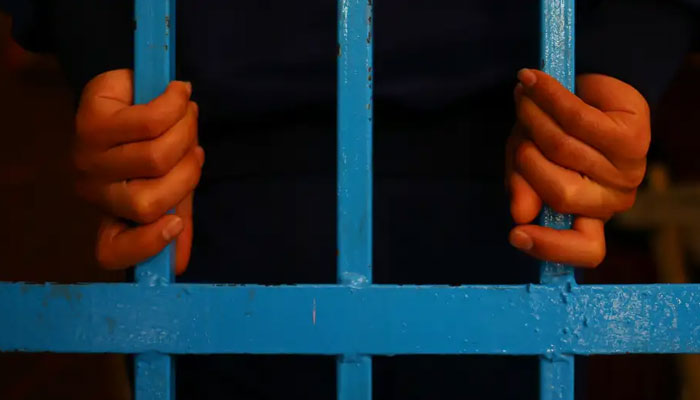Children in jail
Pakistan has around 1,300 juvenile offenders in jail. Some of them are under-trial prisoners and are forced to live a life behind bars because neither they nor their parents have the means to afford to pursue court cases. But the fact that such a large number of children are in jail should be a cause for concern for authorities who should see this sorry figure as their collective failure. To its credit, the Sindh Human Rights Commission (SHRC) has recently asked the Sindh High Court to devise a mechanism to offer free legal aid to the 385 children incarcerated across the province. According to the data collected, the ages of these ‘prisoners’ range from 13 to 18 years.
There are several factors which lead to a child committing a crime. The first one is the kind of environment a child is exposed to at home. Domestic violence, loss of parents, financial difficulties, and other related traumas that a child faces at the early stages of life play a big role in turning him/her into a rebel. And when their fate takes them to people who boast about the rewarding world of crime, they do not think twice. People in our country rarely try to find out the factors that lead a child to commit punishable offences. The immediate reaction is to use brutal punishments against children so that they dare not repeat the offence. As a result, there are hardly any voices in favour of what society as ‘criminals’ who should not be allowed a chance at redemption.
At least 24 million children are out of school in Pakistan; most children come from low-income families where parents do not have enough means to provide the essentials to their children. Some run away from their houses at a young age and find themselves trapped in the world of crime and robbery. The lack of compassion shown by people towards such offenders also translates into these children not wanting to mend their ways. When they are released, their past mistakes keep them away from any opportunities that can help them lead a crime-free life. It is good that some organizations are thinking about these juvenile offenders’ rehabilitation and making a case for the early release of children who still have a chance to lead a respectable life. It is also equally important to ensure that all such detainees are treated humanely and with compassion. Jails should serve as corrective centres for children who may find themselves lost in an increasingly tough world. Similarly, authorities should consider tackling the factors responsible for pushing children into the abyss of despair.
-
 Jelly Roll Finally Shares Painful 'secret' Following 2026 Grammy Win: 'Wanted To Scream'
Jelly Roll Finally Shares Painful 'secret' Following 2026 Grammy Win: 'Wanted To Scream' -
 Noah Wyle Gives Exciting Update About 'The Pitt' Season 3
Noah Wyle Gives Exciting Update About 'The Pitt' Season 3 -
 Who Is Behind Princess Eugenie, Beatrice's Ban From Royal Ascot Amid Sarah, Andrew Scandal?
Who Is Behind Princess Eugenie, Beatrice's Ban From Royal Ascot Amid Sarah, Andrew Scandal? -
 Kate Middleton Sunbathing Photos: New Book Sheds Light On Prince William's Reaction
Kate Middleton Sunbathing Photos: New Book Sheds Light On Prince William's Reaction -
 Jim Curtis Shares Rare Details How His Relationship With Jennifer Aniston Started
Jim Curtis Shares Rare Details How His Relationship With Jennifer Aniston Started -
 Who Organized 'The Office' Reunion At Actors Awards 2026? Revealed
Who Organized 'The Office' Reunion At Actors Awards 2026? Revealed -
 King Charles Set To Abdicate Next Year, 'official Reason' Revealed
King Charles Set To Abdicate Next Year, 'official Reason' Revealed -
 Paris Hilton's Power Move To Make 'neurodiversity Relatable'
Paris Hilton's Power Move To Make 'neurodiversity Relatable' -
 Michelle Williams Remembers 'friend' James Van Der Beek After His Death
Michelle Williams Remembers 'friend' James Van Der Beek After His Death -
 Woody Harrelson Unveils The Favour ‘living Legend’ Harrison Ford Asked For Before Actor Awards
Woody Harrelson Unveils The Favour ‘living Legend’ Harrison Ford Asked For Before Actor Awards -
 How Long Have Zendaya And Tom Holland Been Dating?
How Long Have Zendaya And Tom Holland Been Dating? -
 Real Reason Why 'Only Murders In The Building' Cast Didn't Attend 2026 Actor Awards
Real Reason Why 'Only Murders In The Building' Cast Didn't Attend 2026 Actor Awards -
 Prince William Makes Big Decision After Princess Eugenie, Beatrice Ban
Prince William Makes Big Decision After Princess Eugenie, Beatrice Ban -
 GLP-1 Drugs Linked To Osteoporosis And Gout: New Study Reveals Higher Risks
GLP-1 Drugs Linked To Osteoporosis And Gout: New Study Reveals Higher Risks -
 Seth Rogen Unveils Catherine O’Hara's Distinguished Quality In Emotional Tribute
Seth Rogen Unveils Catherine O’Hara's Distinguished Quality In Emotional Tribute -
 MWC 2026: New Smartphones, AI Gadgets And Tech Innovations Revealed
MWC 2026: New Smartphones, AI Gadgets And Tech Innovations Revealed




